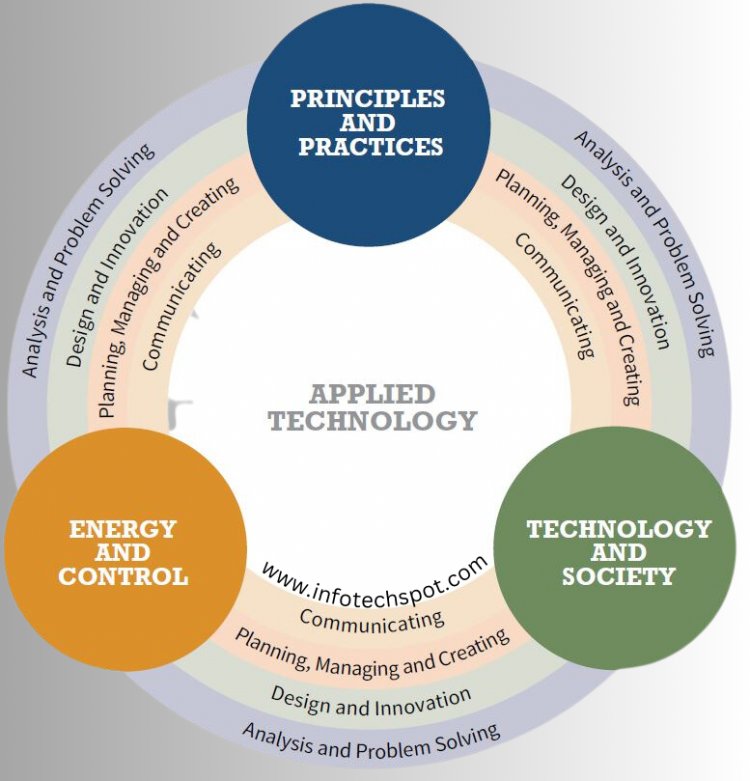The Transformative Power of Applied Technology
The role of technology has become more prominent than ever before. From artificial intelligence and robotics to data analytics and the Internet of Things, technology is continuously revolutionizing our lives.

Introduction:
In today's rapidly evolving world, the role of technology has become more prominent than ever before. From artificial intelligence and robotics to data analytics and the Internet of Things, technology is continuously revolutionizing our lives. One aspect that has gained significant traction is applied technology, which focuses on the practical implementation of scientific knowledge to solve real-world problems. In this article, we will explore its transformative power of it and its profound impact on various sectors, paving the way for a brighter and more innovative future.
The Foundation of Applied Technology:
It refers to the practical application of scientific knowledge for practical purposes. It takes theoretical concepts and translates them into tangible solutions, products, or processes that can address specific needs and challenges. Unlike pure research, which aims to expand knowledge, it aims to create something valuable that can be utilized to improve our lives.
Enabling Innovation and Advancement:
It plays a pivotal role in driving innovation and advancement across different industries. It fuels progress by providing practical solutions and tools that streamline processes, increase efficiency, and enhance productivity. In fields such as healthcare, agriculture, transportation, and manufacturing, It has the potential to revolutionize traditional practices and usher in new possibilities.
Healthcare:
In the realm of healthcare, it is transforming the way we approach diagnosis, treatment, and patient care. Cutting-edge technologies like telemedicine, wearable devices, and AI-powered diagnostic tools enable remote monitoring, early detection of diseases, and personalized treatment plans. Furthermore, advanced robotics assists surgeons in performing complex procedures with precision and minimal invasiveness, leading to faster recovery times and improved patient outcomes.
Agriculture:
Applied technology is revolutionizing the agricultural sector, addressing the challenges of food security and sustainable farming. Smart farming techniques leverage sensors, drones, and data analytics to optimize crop management, irrigation, and pest control, resulting in higher yields and reduced environmental impact. Additionally, genetic engineering and biotechnology are paving the way for the development of drought-resistant and disease-resistant crops, ensuring food availability in regions prone to adverse climate conditions.
Transportation:
The transportation industry is undergoing a significant transformation, thanks to applied technology. Electric vehicles, autonomous cars, and intelligent traffic management systems are revolutionizing urban mobility, reducing carbon emissions, and improving road safety. Additionally, the development of hyperloop technology and autonomous drones for delivery purposes holds the potential to revolutionize logistics, enabling faster and more efficient transportation of goods.
Manufacturing:
In manufacturing, applied technology is driving the concept of Industry 4.0, characterized by automation, interconnectedness, and data-driven decision-making. Smart factories employ robotics, artificial intelligence, and the Internet of Things to optimize production processes, minimize downtime, and ensure product quality. This digital transformation is streamlining supply chains, enabling just-in-time production, and fostering customization, leading to increased productivity and reduced costs.
Challenges and Considerations:
While applied technology offers immense opportunities, it also presents challenges and considerations that need to be addressed. Privacy concerns, ethical implications, and potential job displacement are some of the key areas that require careful attention. As technology continues to advance, it is crucial to strike a balance between innovation and the well-being of individuals and society as a whole.
Conclusion:
It has become a driving force behind progress and innovation in various sectors. From healthcare to agriculture, transportation to manufacturing, it is reshaping industries, improving efficiency, and enhancing the quality of life. Its transformative power of it lies in its ability to bridge the gap between scientific knowledge and practical implementation, unlocking new possibilities and solving complex problems. As we navigate the future, embracing and harnessing the potential of it will be key to shaping a brighter and more prosperous world.










